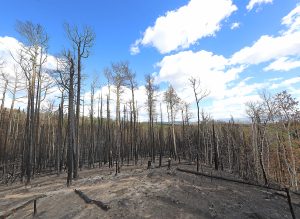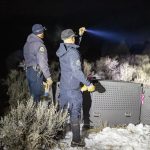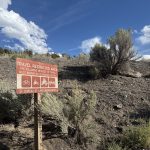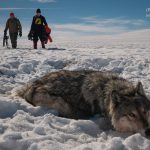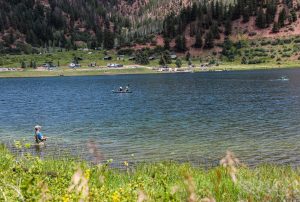A group of producers and elected officials is again asking Colorado Parks and Wildlife to hit pause on wolves
Just under 30 groups signed a petition asking the agency to stop bringing wolves to Colorado
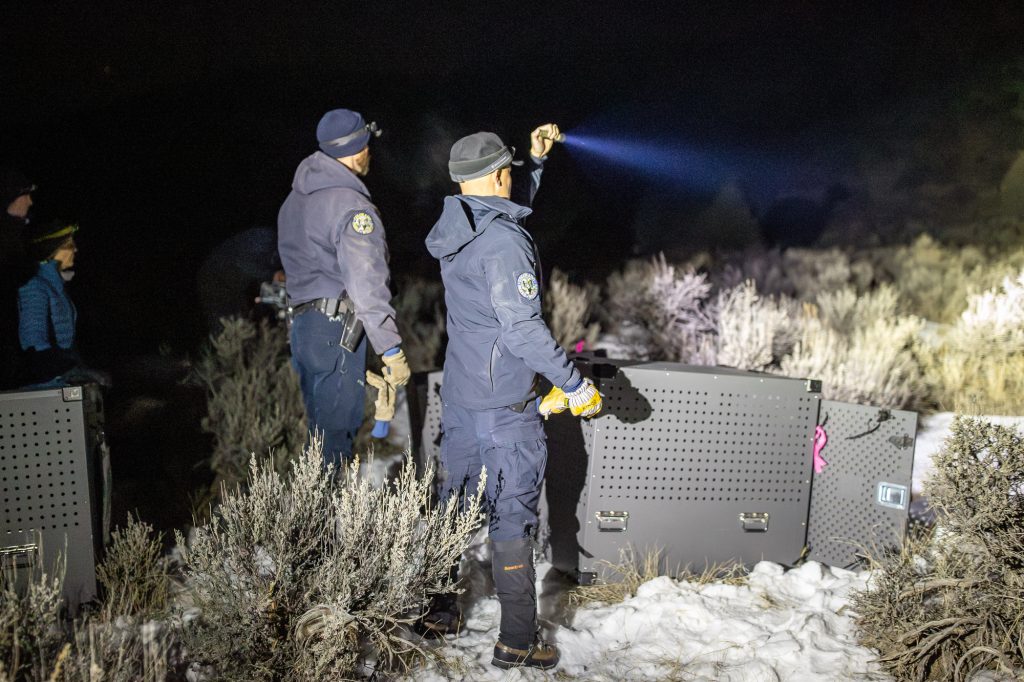
Colorado Parks and Wildlife/Courtesy Photo
A group of 29 agricultural groups, hunting organizations and county commissioners is asking Colorado Parks and Wildlife not to release any more wolves until next winter.
The entities submitted a citizen petition to the agency on Sept. 5, marking the latest attempt to pause Colorado’s voter-mandated wolf reintroduction as concerns percolate about rising costs, livestock losses and a feeling of unpreparedness to deal with wolves on the ground from some communities and producers.
“Ranchers are doing everything we can to coexist, but the state has not held up its end of the deal,” said Tim Ritschard, representing one of the petition’s signing organizations, Middle Park Stockgrowers, in a news release. “When wolves kill our cattle, our families pay the price emotionally, financially, and generationally. Until (Colorado Parks and Wildlife) can demonstrate it can manage the wolves already here, adding more is irresponsible.”
The petition was also signed by the Gunnison County Stockgrowers Association, Colorado Cattlemen’s Association, Colorado Wool Growers Association, Holy Cross Cattlemen’s Association, county commissions from Grand, Delta, Moffat, Garfield, Rio Blanco, Mesa, Montrose and Jackson counties, and 16 other entities.
The groups are asking Parks and Wildlife to delay wolf releases until at least Nov. 16, 2026. The petitioners argue that the one-year delay will give the state time to address program shortfalls and fully meet the intent of Proposition 114, the measure voters passed in 2020 to initiate wolf reintroduction.
“The (Parks and Wildlife) Commission met its obligation to begin reintroduction by 2023,” said Erin Spaur, president of the Colorado Cattlemen’s Association. “Now it must meet its equally important obligation to resolve conflicts.”
Proposition 114 required Colorado Parks and Wildlife to develop a plan to reintroduce and manage gray wolves in the state, begin reintroduction by Dec. 31, 2023, and use state funds to help producers prevent wolf conflicts and pay fair compensation for livestock losses.
The ballot measure also stipulated that the program “must be designed to resolve conflicts” with ranchers and farmers.
It is this provision that petitioners argue the state has not met.
“The division’s management of chronic depredations by the Copper Creek Pack and other chronically depredating wolves underscores that the Division currently lacks the ability to effectively prevent and resolve conflicts with persons engaged in farming and ranching activities in Colorado,” according to the petition.
Gunnison County Stockgrowers’ Association*
Colorado Cattlemen’s Association*
Middle Park Stockgrowers Association*
Grand County Board of County Commissioners
Holy Cross Cattlemen’s Association*
Delta County Board of County Commissioners
Colorado Wool Growers Association*
Moffat County Board of County Commissioners
Garfield County Board of County Commissioners
Coloradans for Responsible Wildlife Management
Uncompahgre Cattlemen’s Association*
Colorado Trappers and Predator Hunters Association
Rio Blanco Board of County Commissioners
Mesa County Cattlemen’s Association*
Mesa County Board of County Commissioners
Delta County Livestock Association*
Montrose, Ouray and San Miguel Farm Bureau*
Associated Governments of Northwest Colorado
Club20*
Action Colorado
Colorado Farm Bureau*
Montrose County Board of County Commissioners
Jackson County Board of County Commissioners
Jackson County Water Conservancy District
West End Livestock Association
North Park Stockgrowers Association*
Colorado Outfitters Association
Larimer County Livestock Association
Shawn Silverberg, Centennial Livestock Auction Manager/Auctioneer
* Organization also signed onto the 2024 petition to pause wolf reintroduction
The petitioners argue that a pause will allow time to meet the provision and address shortfalls like “flawed procedures for missing livestock compensation, a lack of communication between division staff and livestock producers, and inadequate resources for implementing conflict mitigation, among others.”
The groups ask for the agency to decide by the commission’s October or November meetings, given the expected timeline for the next wolf releases.
Parks and Wildlife has said it will release up to 15 wolves in southwest Colorado this winter, marking its third release of wolves since December 2023.
Previous attempts to pause Colorado’s wolf reintroduction have been unsuccessful.
A dozen of the petitioners were among a group of 26 state organizations that made a similar request to the wildlife commission in 2024, ahead of the January 2025 release of 15 wolves from British Columbia. In a petition that was ultimately denied by the commission days before it began the 2025 releases, the organizations asked for the agency to bring no more wolves until it met certain criteria meant to increase communication and prevent livestock-wolf conflict.
In its denial, Parks and Wildlife claimed it had already met the petition’s criteria and that there was a biological need to release more animals to achieve a self-sustainable population of wolves.
A similar response was given in August, when a group of Western Slope legislators attempted to mandate a pause on wolves during a special legislative session. Facing a nearly $1 billion budget hole, the lawmakers proposed a bill that would reallocate the $264,268 set aside for Parks and Wildlife’s 2026 wolf releases and prohibit the agency from releasing more wolves.
However, facing significant backlash from wolf advocates, the governor and Front Range lawmakers, the provision that would have halted the 2026 releases was moved from the final bill version. The agency will have to find money outside of its general fund allocation to pay for the operations.
During the special session, Jeff Davis, director of Parks and Wildlife, told lawmakers that releasing another 15 wolves this winter was critical to the overall success of the wolf restoration and advised against legislating a pause. Wolf advocates argued that a pause would result in significant biological and financial setbacks to the program.
What happens when a petition is submitted to CPW?
Once a petition is submitted to Parks and Wildlife, someone within the agency reviews the request, evaluates the conditions, and then the agency makes a recommendation to the commission to either approve or deny the petition. Approval of a petition requires the commission to hold a rulemaking hearing to make any regulatory change.
At the July commission meeting, Hilary Hernandez, the agency’s regulations manager, said the average petition from 2020 to 2024 took between two to six months from submission to when it was heard by the commission. The timing, she added, depends on things like the complexity of the request, agency workload and when specific regulatory chapters are open for changes.
In addition to the request to pause wolf reintroduction, Parks and Wildlife currently has four other petitions seeking action. This includes requests for the agency to update its mandatory check requirements for three furbearer species, to add more guardrails to its compensation program for losses from wolves, to ban the commercial sale of wildlife fur, and one from PETA to update regulations around reptile caging.
The two petitions regarding furbearers are under review by a furbearer focus group, which is expected to bring recommendations to the commission early next year. The reptile petition is also under review by an internal workgroup reviewing Parks and Wildlife’s reptile regulations. As of July, the wolf compensation petition was still under internal review.

Support Local Journalism

Support Local Journalism
Readers around Steamboat and Routt County make the Steamboat Pilot & Today’s work possible. Your financial contribution supports our efforts to deliver quality, locally relevant journalism.
Now more than ever, your support is critical to help us keep our community informed about the evolving coronavirus pandemic and the impact it is having locally. Every contribution, however large or small, will make a difference.
Each donation will be used exclusively for the development and creation of increased news coverage.

